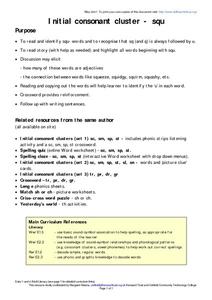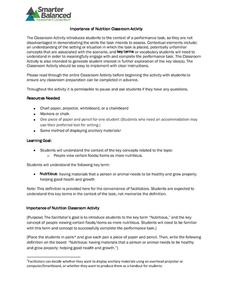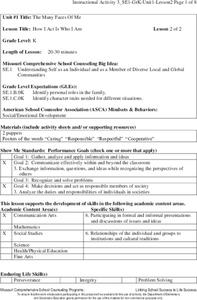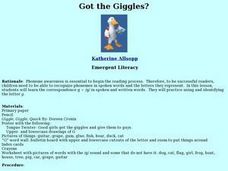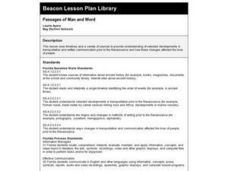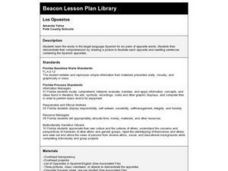Curated OER
Count to 5
A cute illustrated kitten instructs pupils to color 5 of 10 paintbrushes pictured. Then they write the number 5 to complete the sentence frame, "I have coloured ___ paint brushes." The English spelling of "colour" is used.
Curated OER
Beginning Sounds Worksheet
In this early childhood beginning sounds worksheet, students recognize beginning letters of words as they look at the pictures of the newspaper, money, octopus, jellyfish, duck and yarn on the page and choose from the letters in a box...
Curated OER
Initial Consonant Cluster
In this grammar activity, students read and identify squ- words and then, recognize that sq (and q) are always followed by u. They also read a story and highlight all the words that begin with squ. Finally, students complete a crossword...
Curated OER
What Goes With Blocks?
In this associations worksheet, students choose the correct word and picture that goes with blocks. Students decide between the words doll, house, clean, and jump.
Curated OER
What Goes With Cereal?
In this grouping worksheet, students choose the correct word and picture that goes with a cereal. Students decide between the words toast, ball, family, and chair.
Curated OER
What Goes With Circle?
In this grouping worksheet, students choose the correct word and picture that goes with a circle. Students decide between the words cat, girl, my, and triangle.
Anthropological Association
Race: Teacher Guide: Race
How has the concept of race changed over time? Explore the genetic, cultural, and social aspects of race through a series of impactful activities. Scholars discover how race is influenced by inherited traits, examine census records to...
Texas Education Agency (TEA)
Byzantine Architecture
View Byzantine architecture from the comfort of your classroom. A PowerPoint presentation introduces important vocabulary terms and examples of Byzantine architecture in the ninth lesson plan of the 11-part series. A Jeopardy game...
University of the Desert
How Do I Feel That My Culture Is Misunderstood by Others?
Using video clips of young adults from around the world describing their cultures and how they can be misunderstood, learners compare their own cultural point of view to that of others through discussion and writing.
Museum of Disability
Ian’s Walk and Apples for Cheyenne
Help young learners understand friendship and empathy with two reading comprehension lessons. Each lesson focuses on a story about a child with autism, and encourages readers to compare and contrast the characters to each other and to...
Curated OER
The True Confessions of Charlotte Doyle: Graphic Organizer
After completing the first five chapters of The True Confessions of Charlotte Doyle By Avi, use direct quotes to make inferences about how Charlotte feels about certain characters. Later, when the novel has concluded, revisit the text to...
Smarter Balanced
Importance of Nutrition
Prepare your class members for the performance task assessment on nutrition with an activity that asks class members to rank images of foods from least nutritious to most. Participants also offer reasons for why they ranked the foods the...
Missouri Department of Elementary
How I Act Is Who I Am
A lesson centers itself around the topic of family roles. A whole-class discussion uses puppets and posters to go in-depth into the following character traits; caring, responsibility, respect, and cooperation. The discussion closes with...
Curated OER
Got the Giggles
Students identify the grapheme and phoneme for G. They practice writing the letter G and through listening activities, discriminate the phoneme /g/. They associate the phoneme /g/ with its letter representation and identify it in various...
Curated OER
Create Your Own Sporting Event
Students use their imagination and language skills to create and describe their own sporting event. In this sporting event activity, students brainstorm sports related vocabulary and identify their parts of speech. Students categorize...
Curated OER
Seasons
Students explore the four seasons. In this seasons lesson, students create a class tree. Students make leaves for the tree for each of the seasons. Students mark their paper into fourths and draw a picture of the seasons.
Curated OER
Eloquent Speech
Second graders discover that oral and written communication can be improved, and made to sound more eloquent, when the following questions are addressed; Who? What? Where? When? Why? students use word processing to copy a poem using clip...
Curated OER
Uniform-Motion Problems: Just Playing with Cars
Students explore the concept of the formula for distance. For this formula for distance lesson, students time battery operated cars with constant velocity over 15 meters. Students use the distance = rate x time formula to determine the...
Curated OER
Adventures in Archaeology
Expose your archaeologists to a variety of vocabulary words that deal with people who work in the fields of archeology, anthropology, and paleontology. Pictures accompany each of the slides so there is a visual associated with each...
Texas Instruments
TI-Nspire™ CAS
When it comes to rating educational calculators, this calculator is always near the top of this list. Now it's available as an app. There is a lot of calculator power wrapped up in this app. Not only is this a fully functioning...
Curated OER
Passages of Man and Word
Third graders explore transportation and written communication prior to the Renaissance.
Curated OER
Los Opuestos (Opposites)
Middle schoolers examine and discuss various pairs of opposites, repeating the words in Spanish. They draw a picture to illustrate each opposite and write sentences containing the Spanish opposites.
Curated OER
Language Arts:Similes That Make Us Smile
Students identify similes and create their own self descriptions using them as examples. After identifying characteristics associated with pictures of the sun, fish, and other items, they discover how those traits can be used as...
Curated OER
The Me Book
Learners relate to the pictures as symbols so that they come to point to named pictures, explain what pictured objects are for, match pictures to real objects, categorize objects, and recognize words.




